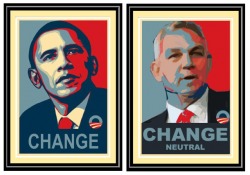"After conducting extensive stakeholder engagement and comprehensive commercial analysis, our review committee, thinking outside the box, has concluded that a proactive ‘change neutral’ approach is required to maximise the NBL’s exposure and potential revenue in order to achieve mission critical outcomes for the forthcoming ‘next generation’ national league," Sengstock told the press conference.
"With customer-focused vertical secured lines, enterprise-wide dynamic productivity, and our focused actuating task-force, the league is in a prime position to develop optimal mandatory bottom-line budgetary management, decentralized 4th generation inheritance, and a customer-focused didactic toolset."
The new poster bears a remarkable resemblance to a campaign poster used by US President Barack Obama. Venturing off his buzz-phrase loaded script, Sengstock conceded there were similarities. "It may appear to be a rip-off, but Obama recently won yet another award for this compelling piece of propaganda," Sengstock noted. "The award, of course, was the President of the United States of America."
"I'm all for change, but not if it's so difficult. That's why I take a proactively 'change neutral' approach to leadership," Sengstock added, marking the tenth time he had used his new buzz-phrase during the first five minutes of the press conference.
"Doing nothing, or as I have coined it, 'change neutrality', represents a paradigm shift in modern administration: it's like change, but safer and easier."
"Nonetheless, we (Basketball Australia) are still achieving things. The club owners can't deny that," Sengstock asserted, clenching his Seamus McPeake-shaped stress ball.
When asked if an image of Sengstock on a poster purported to promote Basketball Australia was shameless self-promotion, Sengstock appeared agitated, throwing the spherical stress ball towards the bin, only to airball it. "If Rick Burton can put his signature on the game ball, why can't I put my face on this new Basketball Australia poster?"

 RSS Feed
RSS Feed